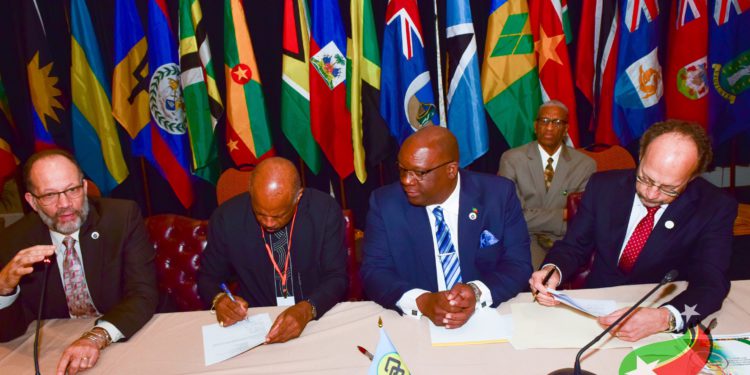Basseterre, St. Kitts, February 26, 2019 (SKNIS): An important aspect of the 30th Inter-sessional Meeting of the Conference of Heads of Government of CARICOM was the signing of a Memorandum of Understanding (MoU) between the Caribbean Public Health Agency (CARPHA) and the University of the West Indies (UWI) on Tuesday, February 26, 2019.
CARPHA’s Executive Director, Dr. C. James Hospedales, and Sir Hilary Beckles, Vice-Chancellor of UWI, signed the agreement.
“So you are bringing together the two organizations responsible for higher education and for public health to join forces to strengthen training and research to address the health priorities of our region from chronic diseases, climate and health, violence and injuries and the environment we live in,” said Dr. Hospedales.
The executive director said that the written agreement is for five years and it “packages a lot of what we already do in the region” such as health economics with St. Augustine Campus in Trinidad and Tobago; chronic disease at Cave Hill Campus in Barbados, and climate and health at Mona Campus in Jamaica.
“I hope we will be able to leverage it to mobilize more resources for the noble purpose that we both have,” Dr. Hospedales said.
Sir Hilary said that the signing is significant as it points primarily to “putting our house in order”. He said that one of the biggest problems the region faced is the spread of viruses, noting that the cooperation with CARPHA will help to address such.
One such virus he touched on was that of Zika that was prevalent in the region three years ago.
“It required a tremendous mobilization of research, knowledge of institutions and public health, to prepare the region for the arrival of the Zika virus and we did that with tremendous efficiency so that when the Zika began to appear in the region we were ready for it,” said Sir Hilary. “But we learnt a very hard lesson that we need to articulate and integrate all of the public healthcare professionals, the researchers in public health, and the skilled people in virology.”
He added that there are a number of international partners and universities worldwide working closely with UWI but doing their own research “to pull all of this together to build resilience in the region.”









